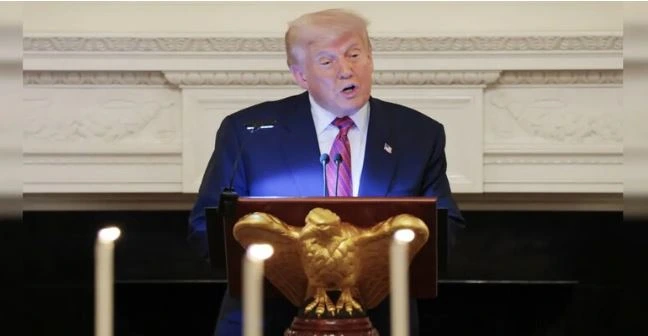Russia and China team together to thwart US move
The US President Donald Trump and his French counterpart Emanuel Macron have called for major changes to Iran’s nuclear deal, known as Joint Comprehensive Plan of Action (JCPOA) despite Tehran’s repeated assertions that the agreement is non-negotiable.
While addressing a joint press conference at White House, French President on Tuesday said, “I can say that we have had very frank discussions on that, just the two of us. We, therefore, wish from now on to work on a new deal with Iran.”
When asked to clarify if he meant a new accord or an add-on agreement, Macron said, “I am not saying that we move from one agreement to another.”
After having delegation level and one-on-one meeting with US President, Emanuel Macron noted that a new deal should incorporate three additional elements, including Iran’s ballistic missile program, Iran’s regional influence and what happens after 2025 when Tehran will restart part of its nuclear program under the accord.
The French president described the 2015 nuclear deal, known as the JCPOA, only as the “first pillar” of a wider final agreement.
French President’s new position is considered to be out of getting influenced by US President Donald Trump’s tough position against the Iran nuclear deal. Earlier it was understood that Macron’s visit to Washington was aimed at convincing Trump not to pull out of the accord.
Trump has to take a call on May 12 if he would extend the Iran deal or withdraw from the multilateral agreement. While standing together with French President he said “I think we will have a great shot at doing a much bigger, maybe, deal,” claiming that any new deal will be based on “solid foundations.”
“This is a deal with decayed foundations. It is a bad deal, it is a bad structure. It is falling down,” Trump said, noting that he will announce his decision on May 12.
Read More: Khemenei warns: Iran will cut the nuclear deal into shreds
Reacting to Iran’s warning of resumption of nuclear enrichment activities if the US withdraws from the deal, Trump said, “They are not going to be restarting anything. If they restart it, they are going to have big problems, bigger than they ever had before. And you can mark it down.”
On Tuesday, Iranian President Hassan Rouhani once again warned US against violating the 2015 nuclear deal, saying any failure to respect the multinational agreement would have “grave consequences.”
Read More: Trump’s U Turn; US Confirms Iran’s Nuclear Deal Compliance
Moreover Iran’s Foreign Minister Javad Zarif, while responding to questions by Associated Press on Tuesday, has said that Iran will “most likely” abandon the 2015 nuclear deal should the US choose to withdraw from the JCPOA signed among Iran and P5+1.
Read More:Trump’s U Turn; US Confirms Iran’s Nuclear Deal Compliance
He stressed that if US President Donald Trump reinstates sanctions against Iran, which were lifted under the nuclear pact, he is “basically killing the deal,” thus Tehran will no longer be bound by the accords limits on its activities.
“If the United States were to withdraw from the nuclear deal, the immediate consequence in all likelihood would be that Iran would reciprocate and withdraw. There won’t be any deal for Iran to stay in,” Zarif said.
Iran has earlier stressed that European signatories to the JCPOA should convince Trump not to pull out of the deal.
Read More: Iran Receives G-77 Support against US Tirade on Nuclear Deal
The 2015 JCPOA removed nuclear-related sanctions against Tehran, which, in turn, changed some aspects of its nuclear energy program.
All other signatories, the permanent members of UN Security Council and Germany have warned the US against quitting the deal.
Trump has asked the European parties to “fix the terrible flaws” of the accord by May 12 otherwise Washington would withdraw from the deal.
Amid Trump’s threats, other parties have stepped up diplomatic efforts to save the deal. German Chancellor Angela Merkel will also visit Washington later this week to discuss the issue.
Russia and China have issued a draft statement, calling on the UN member states to express their “unwavering support” to Tehran amid the US efforts to scrap the deal.
Russian Foreign Minister Sergei Lavrov had reportedly said on Monday that he had agreed with his Chinese counterpart that two countries would try to block US attempt to sabotage the nuclear deal.


 India News20 hours ago
India News20 hours ago
 Cricket news20 hours ago
Cricket news20 hours ago
 India News19 hours ago
India News19 hours ago
 Latest world news7 hours ago
Latest world news7 hours ago
 Latest world news7 hours ago
Latest world news7 hours ago
 Latest world news7 hours ago
Latest world news7 hours ago
 India News7 hours ago
India News7 hours ago









